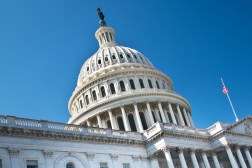NSF to disburse $75M between 3 new quantum computing institutes

The National Science Foundation plans to disburse $75 million between three new institutes created to advance quantum information science (QIS) research and development.
Established by the White House Office of Science and Technology Technology Policy, in partnership with NSF, the Quantum Leap Challenge Institutes will also train an emerging quantum workforce.
Universities are hosting the institutes, which will leverage the resources of the Department of Energy‘s National Laboratories and industry to craft in-person and online curricula for students and teachers from primary school to professional development.
“Through the Quantum Leap Challenge Institutes, NSF is making targeted investments,” said Director Sethuraman Panchanathan in an announcement Tuesday. “Within five years, we are confident these institutes can make tangible advances to help carry us into a true quantum revolution.”
Those five years will be critical to answering “some fundamental research questions,” Panchanathan said.
The Institute for Enhanced Sensing and Distribution Using Correlated Quantum States will be led by the University of Colorado and develop sensors for precisely measuring everything from radiation levels to the effects of gravity.
A second Institute for Hybrid Quantum Architectures and Networks will be hosted by the University of Illinois, Urbana-Champaign and build interconnected networks of small-scale quantum processors for numerous applications.
The final Institute for Present and Future Quantum Computing will be hosted by the University of California, Berkeley and design large-scale quantum computers and algorithms for new platforms with the goal of proving they can outperform the best classical computers.
OSTP released the first national strategic plan for QIS in 2018, the same year the National Quantum Initiative Act, investing in QIS and coordination, became law.
The White House established the National Quantum Coordination Office in 2019, and the Trump administration’s fiscal 2021 budget proposal committed to doubling QIS investment by the following fiscal year.
“America’s future depends on our continued leadership in the most cutting-edge industries of tomorrow,” said Michael Kratsios, U.S. chief technology officer, in a statement.






